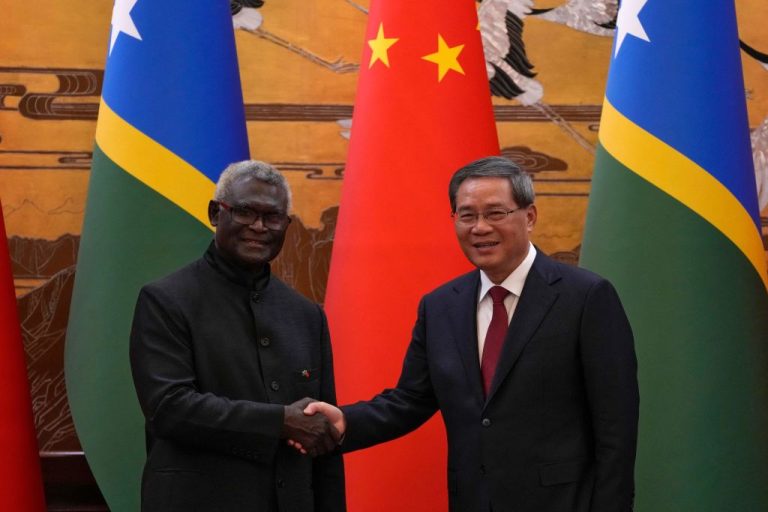On Wednesday, April 24, U.S. President Joe Biden signed a long debated foreign aid package worth a staggering $95 billion, that earmarks around $61 billion to assist Ukraine in its defense against Russian aggression, $26 billion to support Israel, and another $8 billion for Taiwan and other U.S. allies in the Asian region.
The legislation also includes a law requiring Bytedance — the Chinese owner of popular social media platform TikTok — either divest its American operations within a year or be banned outright in the United States.
Last weekend the U.S. House of Representatives voted on the bill, passing it with a vote of 311-112. Notably, 112 Republicans opposed the legislation, with only 101 in support.
On April 23, the package then made its way to the Senate where it was passed with 79 voting in favor and 18 opposing before it landed on Biden’s desk, where it was signed into law.
Biden praised lawmakers for what he called an effort “to answer history’s call at this critical inflection point.”
Success
You are now signed up for our newsletter
Success
Check your email to complete sign up
The aid package comes as Russia is making steady advances on the Ukrainian battlefield, and as tensions rise in the Middle East.
“Congress has passed my legislation to strengthen our national security and send a message to the world about the power of American leadership: we stand resolutely for democracy and freedom, and against tyranny and oppression,” the president said.
Democratic senator Chuck Schumer, in a floor speech on Tuesday, said, “Today the Senate sends a unified message to the entire world: America will always defend democracy in its hour of need.”
The legislation had been plagued by delays and setbacks until just the previous week when the House approved four bills that rushed funding to the three American allies, while approving a conservative proposal that could see TikTok banned nationwide.
“After more than six months of hard work and many twists and turns on the road, America sends a message to the entire world: we will not turn our back on you,” Schumer said, adding that, “Tonight we tell our allies: we stand with you. We tell our adversaries: don’t mess with us. We tell the world: the United States will do everything to safeguard democracy and our way of life.”
READ MORE:
- Biden Proposes Tripling Tariffs on Chinese Steel, Aluminum to Counter Beijing’s Product Dumping
- US Puts Pressure on China as Ukraine War Escalates
- Communist China Heads Down a Road of Isolation and Impoverishment
By the numbers
Of the roughly $61 billion allotted for Ukraine, it’s expected $23.2 billion will be used to replenish defense goods and services, $11.3 billion for ongoing U.S. military operations in the region, $13.8 billion for Ukraine to acquire modern defense systems and $1.6 billion in Foreign Military Financing (FMF) for Ukraine and other regional allies.
The remaining roughly $11 billon is earmarked for a variety of other initiatives, including $26 million to oversee and ensure accountability for the aid and equipment sent to Ukraine, $5 million for the State Department to manage the defense assistance and $300 million to enhance Ukraine’s border security and legal governance, among other things.
The aid package also includes $149 million for the U.S. National Nuclear Security Administration to respond to nuclear threats in Ukraine.
Israel is set to receive around $26 billion to support its offensive against the Hamsa terrorist organization and to offer humanitarian aid for civilians impacted by the violence in Gaza.
Roughly $4 billion of that is expected to be used to replenish Israel’s missile defense systems and more than $9 billion will go to humanitarian aid in Gaza.
Taiwan is set to receive around $8 billion in aid to help the island democracy counter Beijing’s aggression.
Roughly $3.3 billion will go towards submarine infrastructure and development, with another $1.9 billion going to replenish U.S. weapons provided to Taiwan and other regional allies.
According to the Daily Mail, on April 21, Taiwan’s defense minister, in comments concerning the aid, appeared to accidently admit that American troops have been stationed off the coast of China for some time, which, if true, would be a startling escalation of hostilities in the region.
READ MORE:
- New House Bill Targets TikTok
- TikTok Surges in VIetnam Despite Increased Regulatory Pressures
- China’s Overseas Product Dumping: Addressing Unfair Competition Caused by Systemic Differences
TikTok: Divest from Chinese control or ban
Along with the aid package was a bill seeking to ban the popular short video streaming platform, TikTok.
Specifically, the legislation gives Bytedance — the Chinese owner of the platform — one year to either divest its American operations or be banned outright nationwide.
With around 170 million U.S. users, TikTok has received criticism from those concerned it is used by the Chinese Communist Party (CCP) to spread propaganda among Americans and harvest their personal data en masse.
Proponent of the measure, Senator Marco Rubio, the top Republican on the Intelligence Committee, said, “For years we’ve allowed the Chinese Communist Party to control one of the most popular apps in America. That was dangerously short-sighted … A new law is going to require its Chinese owner to sell the app. This is a good move for America.”
In a statement, TikTok said the new law was “unconstitutional” and vowed to “challenge it in court.”
- (2022) TikTok Owner ByteDance Accused of Promoting Pro-China Messaging: Ex-Employees
- Massive Data Breach Unveils Espionage, Cyber Vulnerabilities Within China’s Security Systems
TikTok has been accused of promoting pro-CCP content, playing up various societal ills of the United States, and having its algorithm push content promoting self-harm and dangerous behavior. By contrast, Douyin, the mainland Chinese version of the app, promotes educational and pro-social content.
Regarding concerns that the app is being utilized by Chinese communist authorities to influence American discourse, TikTok’s parent company, Bytedance, insisted recently that it “is not an agent of China or any other country.”
Shou Zi Chew, Bytedance chief executive, said last month that the company will do everything within its “legal rights” to protect the platform.
Andrew Przybylski, professor of human behavior and technology at Oxford University, told the BBC, “About two in three young people in the U.S. have a TikTok account,” adding that the “primary challenge” in banning the app will be issues around freedom of speech and freedom of expression.
“The UN Charter on the Rights of the Child is quite specific: young people have a right to information and a right to play, so I think it can be challenged on those grounds,” he argued.
All Chinese companies are obligated by law to turn over information to the authorities if the Communist Party deems it necessary for national security or other reasons, such as espionage.

















